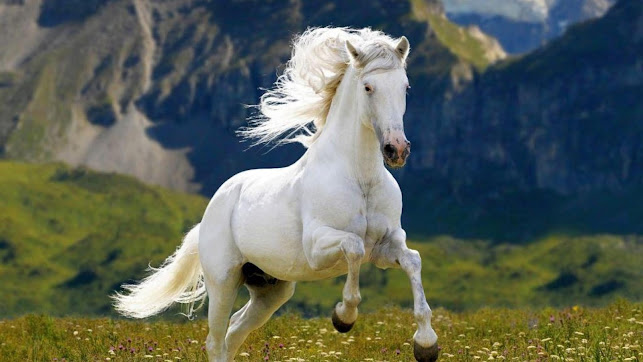Since ancient times, horses have played a pivotal role in human history, serving as companions, workers, and partners in adventure. With their graceful movement, intelligence, and unwavering loyalty, horses continue to capture our imaginations and inspire a sense of wonder.
The Evolution of Horses
Horses, members of the equine family, have evolved over
millions of years from small, multi-toed ancestors to the magnificent creatures
we know today. Through natural selection and domestication by humans, horses
have developed a remarkable array of breeds suited to diverse tasks and
environments.
The Bond Between Humans and Horses
The relationship between humans and horses is one of mutual
benefit and companionship. From the nomadic tribes of the Eurasian steppes to
the knights of medieval Europe, horses have been indispensable partners in
exploration, transportation, agriculture, and warfare. Today, horses continue
to enrich our lives as beloved companions, athletes, and therapy animals.
Horses in Sport and Recreation
Horseback riding is not only a competitive sport but also a
recreational activity enjoyed by people of all ages and backgrounds. From the
thrill of racing to the precision of dressage and the excitement of jumping,
equestrian sports offer a unique blend of athleticism, skill, and partnership
between horse and rider. Additionally, activities such as trail riding, horse
camping, and carriage driving allow enthusiasts to experience the beauty of
nature from the back of a horse.
Equine Care and Management
Proper care and management are essential for ensuring the
health and well-being of horses. This includes providing a balanced diet
tailored to their nutritional needs, regular exercise to maintain physical
fitness, routine veterinary care, and appropriate shelter and protection from
the elements. Additionally, grooming, hoof care, and dental maintenance are
crucial aspects of equine hygiene and health.
The Diversity of Horse Breeds
Horses come in a wide range of breeds, each with its own
unique characteristics, temperament, and abilities. From the powerful draft
horses used for pulling heavy loads to the nimble Arabian horses prized for
their endurance and agility, there is a breed suited to nearly every purpose
and preference. Breeds may vary in size, color, conformation, and skill set,
reflecting centuries of selective breeding and specialization.
The Future of Horses
As our understanding of equine behavior, physiology, and
welfare continues to evolve, so too does our approach to horse care and
management. Advances in veterinary medicine, nutrition, and training techniques
enable us to provide horses with the highest standards of care and ensure their
well-being for generations to come. Additionally, efforts to conserve wild
horse populations and protect their natural habitats are essential for
preserving the genetic diversity and ecological integrity of these iconic animals.
FAQS
What are the different breeds of horses?
There are numerous horse breeds, each with its own unique
characteristics and abilities. Some popular breeds include the Arabian,
Thoroughbred, Quarter Horse, Appaloosa, Paint Horse, and Belgian Draft Horse,
among many others. These breeds vary in size, temperament, conformation, and
intended use, ranging from racing and show jumping to draft work and leisure
riding.
How long do horses live?
The lifespan of a horse varies depending on factors such as
breed, genetics, diet, healthcare, and living conditions. On average, horses
live between 25 to 30 years, although some may live into their 40s with proper
care and management.
What do horses eat?
Horses are herbivores and primarily eat hay or grass, which
provide them with the fiber and nutrients they need for optimal health. In
addition to forage, horses may also be fed concentrates such as grains or
pellets to supplement their diet with essential vitamins and minerals. It's
important to provide horses with a balanced diet tailored to their nutritional
needs and activity level.
How much exercise do horses need?
The amount of exercise a horse needs depends on factors such
as age, breed, fitness level, and intended use. Generally, horses benefit from
regular exercise to maintain physical fitness, mental stimulation, and overall
well-being. This may include daily turnout in a pasture or paddock, riding or
driving sessions, and participation in equestrian sports or recreational
activities.
How do I care for a horse's hooves?
Hoof care is essential for maintaining a horse's health and
soundness. This includes regular trimming or shoeing by a qualified farrier to
maintain proper hoof balance and prevent issues such as overgrowth or uneven
wear. Additionally, keeping the hooves clean and dry, providing proper footing,
and monitoring for signs of injury or disease are important aspects of hoof
care.
How do I choose the right horse for me?
Choosing the right horse involves considering factors such
as your riding experience, riding goals, budget, and lifestyle. It's important
to spend time getting to know different horses, assessing their temperament,
suitability, and compatibility with your needs and preferences. Working with a
knowledgeable trainer or equine professional can also help guide you in
selecting the right horse for your individual circumstances.
What are common health issues in horses?
Horses may be prone to various health issues, including
lameness, colic, respiratory infections, dental problems, and skin conditions.
Regular veterinary care, preventive measures such as vaccinations and parasite
control, proper nutrition, and attentive management practices are essential for
preventing and managing health problems in horses.
Conclusion
Horses embody the timeless qualities of strength, beauty,
and companionship that have endeared them to humans for millennia. Whether
galloping across open fields, performing intricate dressage movements, or
simply grazing contentedly in a sunlit pasture, horses captivate us with their
grace and presence. By honoring and cherishing these majestic creatures, we
honor the enduring bond between humans and horses that enriches our lives in
countless ways.








.webp)

.webp)

No comments:
Post a Comment